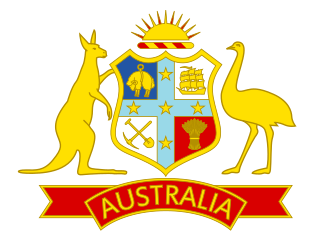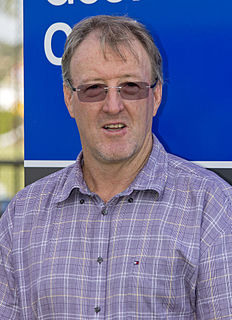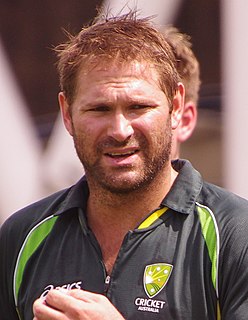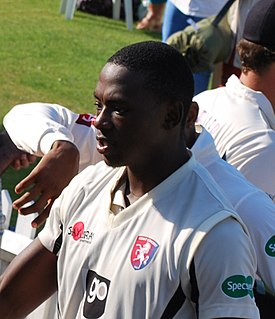
Kapil Dev Ramlal Nikhanj is a former Indian cricketer. He was a fast medium bowler and a hard hitting middle order batsman. Widely regarded as one of the greatest all-rounders to play the game, he is also regarded as one of the greatest captains of all time. He is honorary Lieutenant Colonel with the Indian Territorial Army. He led India to win its first Cricket World Cup title in 1983. He was named by Wisden as the Indian Cricketer of the Century in 2002.

The Australia men's national cricket team represents Australia in men's international cricket. As the joint oldest team in Test cricket history, playing in the first ever Test match in 1877, the team also plays One-Day International (ODI) and Twenty20 International (T20I) cricket, participating in both the first ODI, against England in the 1970–71 season and the first T20I, against New Zealand in the 2004–05 season, winning both games. The team draws its players from teams playing in the Australian domestic competitions – the Sheffield Shield, the Australian domestic limited-overs cricket tournament and the Big Bash League.
Kepler Christoffel Wessels is a South African-Australian cricket commentator and former cricketer who captained South Africa after playing 24 Tests for Australia. Since retiring he has been a lawn bowls competitor.

Geoffrey Francis Lawson, is an Australian cricket coach and former cricketer and the former coach of the Pakistan cricket team.
Wayne Bentley Phillips is a former Australian cricketer who played in 27 Test matches and 48 One Day Internationals (ODIs) between 1982 and 1986 as a batsman and wicket-keeper. He played for South Australia between 1978 and 1991
Carl Gray Rackemann is a former Queensland and Australian cricketer. He was a fast bowler in 12 Test matches, 52 One Day Internationals and 167 first-class cricket matches in a career spanning 1979/80 to 1995/96.
Stephen John Rixon is an Australian cricket coach and former international cricketer. He played in 13 Test matches and six One Day Internationals between 1977 and 1985. He has coached the New Zealand cricket team, New South Wales cricket team, Surrey County Cricket Club, Hyderabad Heroes and the Chennai Super Kings of the Indian Cricket League and was the fielding coach of the Australian national cricket team, Pakistan national cricket team and Sri Lanka national cricket team.
Aron "Ali" Bacher is a former South African Test cricket captain and an administrator of the United Cricket Board of South Africa.
The South African rebel tours were a series of seven cricket tours staged between 1982 and 1990. They were known as the rebel tours because the international cricketing bodies banned South Africa from competitive international cricket throughout this period because of apartheid. As such the tours were organised and conducted in spite of the express disapproval of national cricket boards and governments, the International Cricket Conference and international organisations such as the United Nations. The tours were the subject of enormous contemporaneous controversy and remain a sensitive topic throughout the cricket-playing world.

Mitchell Guy Johnson is an Australian former cricketer, who played all forms of the game until his retirement from international cricket in 2015. He is a left-arm fast bowler and left-handed batsman. He made his Test debut for Australia in November 2007. Johnson was considered to be one of the greatest fast bowlers of his era.
John Norman Maguire is a former Australian cricketer who played in three Test matches and 23 One Day Internationals in 1983 and 1984.
The Australian cricket team toured England in the 1985 season to play a six-match Test series against England.
Michael David Taylor was an Australian first class cricketer who played for Victoria and Tasmania, and despite never playing Test cricket or One Day Internationals for Australia, also participated in the South African rebel tours. Highlights of his career included 1000 first class runs in a season while playing with both Victoria and Tasmania and an unbeaten 234 for Victoria against the touring West Indians in Melbourne in 1984–85.

Ryan James Harris is an Australian cricket coach and former cricketer. He was a right-arm fast-medium bowler who was a member of the Australia national cricket team until retiring in the Ashes tour lead up of 2015 due to a knee injury. It had hampered him for a majority of his career, but despite this, he performed as one of Australia's most highly rated fast bowlers.
The Australian cricket team toured the West Indies in the 1983–84 season to play a five-match Test series against the West Indies.
Raymond Berry Phillips is an Australian cricketer who was born and raised in New South Wales and originally represented that state, but moved to Queensland in 1979 and played for that state for many years. He was selected for the 1985 Ashes squad but did not appear in any of the Test matches on the tour.
An unofficial Australian cricket team toured South Africa in the 1986–87 season to play a series of unofficial Test and one day matches. It was the second of two tours by the side, the first being in 1985–86. The series was highly controversial in Australia and its Australian participants were banned from interstate cricket for two seasons and international cricket for three seasons.

Kagiso Rabada is a South African international cricketer who plays all formats of the game. He made his South African debut in November 2014 in limited-overs cricket before going on to make his Test debut in November 2015. By January 2018, he had topped both the ICC ODI bowler rankings and the ICC Test bowler rankings aged 22. In July 2018, he became the youngest bowler to take 150 wickets in Tests.





